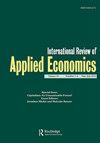Coming together for transition? Entrepreneurial ecosystems for a circular economy
IF 1.4
Q3 ECONOMICS
引用次数: 0
Abstract
ABSTRACT Circular ecosystems can be a role model in the transition to a circular economy, can inspire and motivate other entrepreneurs, and may possibly have a transformative effect in the transition. For example, by deploying knowledge and experience for a targeted lobby for policy change – such as changes in the law and regulations. Four circular ecosystems were studied to discover how they function, and what they may contribute to the transition to a circular economy. The research shows that cooperation in ecosystems can provide circular start-ups with much added value. At the same time, the research also shows that the influence of the four circular ecosystems investigated is limited regarding the local transition to a circular economy. The ecosystems are not examples of a circular economy yet. But ecosystems are not static entities. They are on the move, as this research demonstrates.一起过渡?循环经济的创业生态系统
循环生态系统可以成为向循环经济过渡的榜样,可以激励和激励其他企业家,并可能在过渡中产生变革性影响。例如,通过部署知识和经验,有针对性地游说政策变化——例如法律和法规的变化。研究了四个循环生态系统,以发现它们是如何运作的,以及它们对向循环经济过渡的贡献。研究表明,生态系统的合作可以为循环创业公司提供很多附加价值。与此同时,研究还表明,所调查的四个循环生态系统对当地向循环经济过渡的影响是有限的。这些生态系统还不是循环经济的典范。但是生态系统不是静态的实体。正如这项研究所表明的那样,他们正在移动。
本文章由计算机程序翻译,如有差异,请以英文原文为准。
求助全文
约1分钟内获得全文
求助全文
来源期刊

International Review of Applied Economics
ECONOMICS-
CiteScore
4.30
自引率
4.50%
发文量
37
期刊介绍:
International Review of Applied Economics is devoted to the practical applications of economic ideas. Applied economics is widely interpreted to embrace empirical work and the application of economics to the evaluation and development of economic policies. The interaction between empirical work and economic policy is an important feature of the journal. The Journal is peer reviewed and international in scope. Articles that draw lessons from the experience of one country for the benefit of others, or that seek to make cross-country comparisons are particularly welcomed. Contributions which discuss policy issues from theoretical positions neglected in other journals are also encouraged.
 求助内容:
求助内容: 应助结果提醒方式:
应助结果提醒方式:


